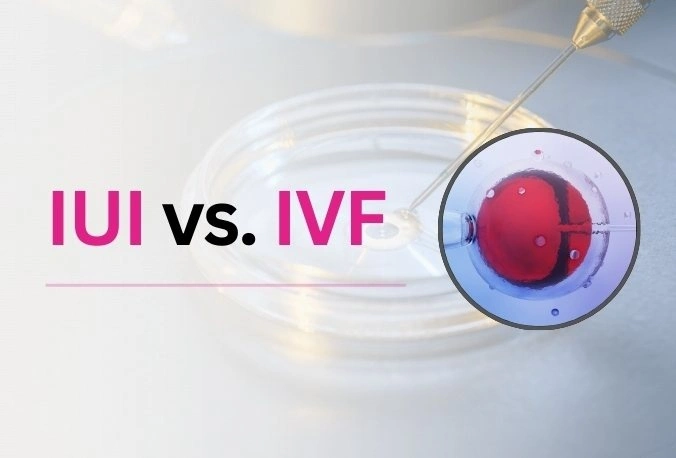Difference between IUI and IVF
– Published on 15 march 2024

For couples struggling with infertility, the journey to parenthood often involves navigating through a maze of options and treatments. In recent years, there has been a significant increase in awareness about fertility treatments and their effectiveness. However, with more treatment options comes confusion and questions for those seeking them.
One commonly misunderstood aspect is the difference between intrauterine insemination (IUI) and in-vitro fertilization (IVF). While both are assisted reproductive techniques, they have distinct differences that make them suitable for different types of individuals or couples.
In this blog post, we will dive into the nuanced details of IUI and IVF— comparing success rates, procedures, costs, and eligibility criteria—and help you determine which option may be best for your unique situation as you pursue your dream of starting or expanding your family.
Intrauterine Insemination (IUI)
Intrauterine Insemination (IUI) is a relatively simple fertility treatment that involves placing sperm directly into a woman’s uterus during ovulation. This timing is crucial, as it enhances the chances of the sperm reaching the egg during its most fertile phase.
The procedure aims to increase the number of sperm that reach the fallopian tubes, thus augmenting the probability of fertilisation. IUI is often the first line of treatment considered in cases of unexplained infertility, mild male factor infertility, or women who have problems with their cervical mucus.
It’s also an option for couples who may not be able to engage in regular sexual intercourse for various reasons.
In-Vitro Fertilisation (IVF)
In-Vitro Fertilization (IVF) is a complex medical procedure where eggs are fertilized by sperm outside of the body, within a laboratory setting. This process involves controlled ovarian hyperstimulation to generate multiple eggs, which are then retrieved through a minor surgical procedure.
Once the eggs are fertilised in the lab, the resulting embryos are monitored for growth before one or more are selected for transfer into the woman’s uterus. IVF is often considered when other less invasive fertility techniques have not been successful.
It can be an effective option for individuals or couples facing a range of fertility issues, including severe male factor infertility, blocked or damaged fallopian tubes, or ovulation disorders.
IVF also allows for the possibility of genetic testing of embryos before transfer, which can be beneficial for those with genetic disorders or recurrent pregnancy loss.
Comparing IUI and IVF
When comparing Intrauterine Insemination (IUI) and In-Vitro Fertilisation (IVF), you’ll find several points to consider, including success rates, procedures, costs, and eligibility criteria.
Success Rates
While both IUI and IVF aim to increase the chances of pregnancy, their success rates vary. IUI has a success rate of approximately 10-20% per cycle, depending largely on the woman’s age and the underlying cause of infertility. On the other hand, IVF has a significantly higher success rate, typically around 40-50% for women under 35, and about 15-30% for women over 40.
Procedures
IUI is a less invasive procedure compared to IVF. It involves placing a sperm sample directly into a woman’s uterus during ovulation. IVF, however, is more complex, involving multiple steps – controlled ovarian hyperstimulation, egg retrieval, fertilisation in a lab, embryo monitoring, and transfer.
Costs
The cost of fertility treatments varies widely across different regions, and Pune is no exception. Due to its complex nature, IVF is typically more costly than IUI. While prices vary, IUI is usually a few hundred pounds, whereas a single cycle of IVF might run into the thousands.
The price of an IUI procedure in Pune can range from ₹5000 to ₹15,000. On the other hand, the cost of a single IVF cycle in Pune tends to be significantly higher, typically starting from around ₹1,00,000 and can go up to ₹2,00,000 or more.
Please bear in mind that these are approximate figures and the actual costs may vary depending on the clinic, the specific treatments required, and any additional tests or procedures needed.
Eligibility Criteria
Both IUI and IVF have specific eligibility criteria. IUI is suitable for individuals with unexplained infertility, mild male infertility, or problems with cervical mucus. It’s also apt for couples who can’t have regular intercourse. IVF, in contrast, is recommended for severe male infertility, blocked or damaged fallopian tubes, ovulation disorders, and those seeking genetic testing for embryos.
It’s crucial to consult with a fertility specialist to understand which treatment is ideal for your specific circumstances.
Considerations for Each Procedure
When choosing between IUI and IVF, several factors must be considered:
- Fertility Factors: For couples with unexplained infertility, mild male infertility, or problems with cervical mucus, IUI is generally the first line of treatment. IVF, however, is the preferred option for severe cases of male infertility, blocked or damaged fallopian tubes, and ovulation disorders.
- Costs: As IUI is less complex than IVF, it is typically less costly. However, the success rate of IUI is also lower, which means that multiple attempts may be required, potentially increasing the overall cost. IVF, though more expensive, generally has a higher success rate per cycle.
- Risks: Both procedures carry some risk. IUI can lead to a higher chance of multiple pregnancies if combined with fertility drugs. IVF, on the other hand, carries risks associated with egg retrieval and embryo transfer procedures, plus the potential for multiple pregnancies.
- Lifestyle Impacts: The time commitment required for each procedure is significant. IUI involves less intervention and is typically quicker, allowing for less disruption to daily life. IVF requires more visits to the clinic, additional medication, and a higher emotional investment due to the intensive nature of the treatment.
- Practical Matters: When considering these treatments, practical matters such as distance to the clinic, available time off work, and emotional support systems should also be taken into account. Both procedures are demanding in different ways, and having a strong support system is crucial.
Questions for Your Doctor
When planning your fertility journey, it’s essential to have an open dialogue with your doctor. Here are some questions you might consider:
- Diagnosis: What are the specific reasons for our infertility? Are there any additional tests we should consider?
- Treatment Options: Given our specific diagnosis, what are the pros and cons of IUI and IVF for our situation?
- Success Rates: What are the success rates of IUI and IVF at the clinic, particularly for patients with situations similar to ours?
- Costs: What are the total costs of these treatments, including medication, procedures, and any additional testing or follow-ups?
- Lifestyle Impacts: How will these treatments affect our daily lives? How much time do we need to commit to visits, procedures, and recovery?
- Risks: What are the potential risks and side effects we should be aware of for each treatment?
- Emotional Support: What resources or support services does the clinic provide to help manage the emotional aspects of fertility treatment?
In conclusion, there is no ‘one-size-fits-all’ approach to fertility treatment. The choice between IUI and IVF should be made in consultation with a fertility specialist, considering all these factors. It is also essential to remember that there are alternative treatment options available, and it’s vital to have open communication with your doctor to find the best option for your circumstances.
Infertility can be a challenging journey, but with the right support and knowledge, it is possible to achieve a successful pregnancy. So if you or someone you know is struggling with fertility issues, don’t hesitate to seek help and explore all the options available.
Remember, every person’s fertility journey is unique, and there is no shame in seeking assistance on the path to parenthood. Let us support each other on this journey towards creating a family. So let’s break the stigma surrounding infertility and start talking about it openly and with compassion.

By Dr Samidha Dalvi-Amale
IVF and Fertility specialist Medical Director- Pune IVF
